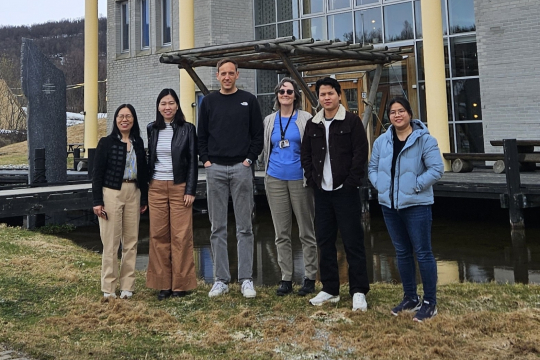The Environment for Development (EfD) initiative is pleased to announce a new collaboration with the Norwegian College of Fishery Science (NCFS) at UiT The Arctic University of Norway. Located north of the Arctic Circle, but with a global reach, this university contributes research that is relevant worldwide through its expertise in sustainable fisheries and aquaculture.
NCFS is a multidisciplinary academic institution with over 50 years of experience in social and natural sciences related to the marine environment. Located in Tromsø in the northern part of Norway, the college’s research spans biology, technology, economics, and governance, with strong interdisciplinary cooperation and a focus on sustainable development in both the Arctic and the Global South.
Already linked to EfD
At the heart of the collaboration is NCFS’s Environmental and Resource Economics research group (MRØ), which specializes in environmental and marine resource economics. Their research includes topics such as ghost fishing, plastic pollution, fisheries subsidies, climate change impacts, invasive species management, and big data applications in aquaculture.
NCFS brings extensive experience in international collaboration, particularly in Vietnam, Ghana, Indonesia, and Sri Lanka. Through projects like EcoGIV—funded by Norad—NCFS supports doctoral training in marine resource economics, capacity development, and policy-relevant research in EfD partner countries. Many of the collaborators and former PhD students in these projects are already linked with EfD centers, further reinforcing the value of this partnership.
“We very much look forward to officially being part of the EfD network,” says Claire Armstrong, Professor at NCFS.
“EfD does a great job in bringing researchers together in successful collaborations,” she says.
Strengthens interdisciplinary research
The collaboration also opens opportunities for joint programs at MSc and PhD levels – one of Claire Armstrong’s pet projects – long-term policy engagement, and collaborations under EfD’s BlueRforD program, which focuses on blue economy research. NCFS’s history of interdisciplinary EU and Norad-funded projects will also be a strong asset for EfD’s global research efforts.
UiT’s strong international orientation, with more than 20 English-language master's programs and over 200 academic exchange agreements, positions the institution as a vibrant and globally connected research hub. By joining the EfD network, UiT–NCFS strengthens its commitment to policy-relevant science and sustainable development, while EfD benefits from its unique expertise in marine systems, Arctic research, and capacity building.
“This new partnership with NCFS will enhance our work on sustainable marine management,” said Gunnar Köhlin, Director of EfD.
“Their expertise in marine research and long-standing engagement in the Global South make them a perfect fit for the EfD network.”
Together, EfD and NCFS aim to deliver high-impact research, support the next generation of environmental economists, and inform policies that promote the sustainable use of marine resources around the world.
By: Petra Hansson

